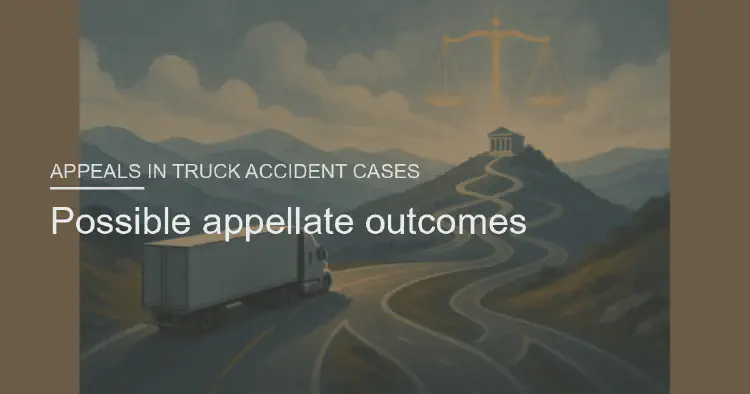Possible appellate outcomes
Once appellate judges review the briefs, oral arguments, and trial record, they issue a decision. This ruling can affirm, reverse, or modify the trial court’s judgment in a truck accident case.
- Truck Accident Law Team
- 2 min read
Article 5 of 6 in Appeals in Truck Accident Cases/

Possible Appellate Outcomes in Truck Accident Cases
1. Affirming the Trial Court’s Decision
- The appellate court agrees with the lower court’s ruling.
- The verdict and damages remain unchanged.
- Most common outcome since appeals courts defer to trial courts on factual issues.
2. Reversing the Decision
- The appellate court finds serious error and overturns the verdict.
- May dismiss the case entirely if the error undermines liability.
- Example: Trial judge wrongly allowed inadmissible evidence that swayed the jury.
3. Remanding for a New Trial
- Case is sent back to trial court for retrial.
- Happens when errors affected the fairness of the trial but do not justify outright dismissal.
- Example: Improper jury instructions in a negligence case.
4. Modifying the Judgment
- Appellate court adjusts part of the verdict without a full retrial.
- May reduce or increase damages based on legal errors.
- Example: Striking punitive damages due to insufficient evidence of gross negligence.
5. Partial Affirmance and Reversal
- Court upholds some parts of the judgment but overturns others.
- Example: Liability is affirmed, but damages are recalculated.
6. Settlement During Appeal
- Sometimes, parties negotiate a settlement while the appeal is pending.
- Avoids further uncertainty and expense.
Legal Importance
- Appellate outcomes shape not only the individual case but also set legal precedents that influence future trucking litigation.
- Understanding potential results helps attorneys develop realistic strategies and advise clients effectively.
Summary: Appellate courts in truck accident cases may affirm, reverse, remand, or modify trial outcomes. Each path has significant consequences for victims and defendants, determining whether compensation stands, changes, or requires a new trial.
You might also like:
- Tags:
- Punitive Damages
- Legal Importance
- Trucking Litigation
- Trial Court
- Appellate Courts
- Appellate Court
- Gross Negligence
- Jury Instructions
- Legal Precedents
- Trial Judge
- Court Decision
- Future Trucking
- Set Legal
- Legal Errors
- Insufficient Evidence
- Trial Court Decision
- Parties Negotiate Settlement
- Set Legal Precedents
- Example Striking Punitive
- Striking Punitive Damages
- Appellate Courts Truck
- Courts Truck Accident
- Outcomes Truck Accident